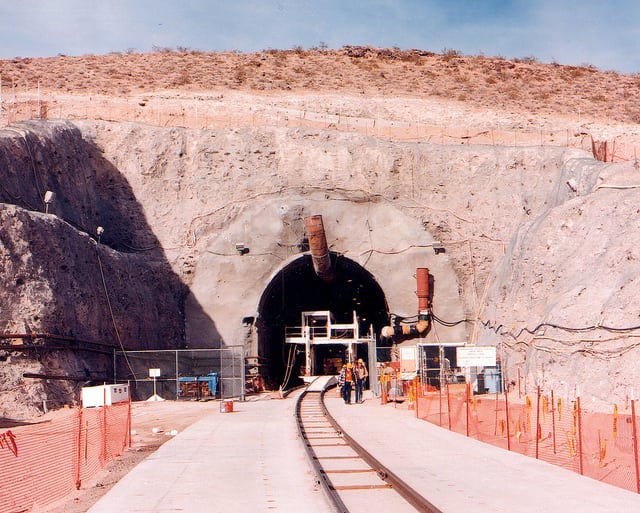
The House of Representatives is expected early in the new year to vote on legislation aimed at advancing the long-planned nuclear waste repository at Yucca Mountain in Nevada.
Multiple informed sources said the floor vote on Rep. John Shimkus’ (R-Ill.) “Nuclear Waste Policy Amendments Act” could happen in the first couple months of 2018, possibly in January. The House has generally supported the Yucca Mountain project, so passage appears probable if not assured. The bill’s future in the Senate, though, is murkier.
Conversations with House members on details of the bill are said to be continuing. There was no official confirmation by press time on the schedule for a vote on H.R. 3053.
In a statement to RadWaste Monitor, Shimkus said he hopes the bill will go to the House floor “as soon as possible,” but that the House majority leader has final say. Majority Leader Kevin McCarthy’s (R-Calif.) office did not respond to a request for comment.
Shimkus introduced his bill in June, and it collected 109 co-sponsors from both parties as it advanced through approval by the House Energy and Commerce Committee that month and posting to the House Union Calendar in October. That steady progress sets the legislation apart from a host of other measures introduced in Congress this year with the aim of breaking the decades-old impasse on disposal of the nation’s nuclear waste; the bills have languished in committee while lawmakers have focused on healthcare, tax reform, and the federal budget.
“We are grateful for Chairman Shimkus’s work on the larger Nuclear Waste Policy Amendments Package … and are optimistic about its chances to pass next year,” the office of Rep. Joe Wilson (R-S.C.) said in a statement. Wilson’s “Sensible Nuclear Waste Disposition Act” has been wrapped into the bill from Shimkus, who chairs the House Energy and Commerce environment subcommittee.
The Illinois congressman has long supported building the Nye County, Nev., underground disposal site for tens of thousands of tons of commercial spent reactor fuel and high-level radioactive waste now spread around the country, as demanded by the 1987 amendment to the 1982 Nuclear Waste Policy Act. In a 2013 op-ed in the Chicago Tribune, he called Yucca the “fastest, best and most viable solution.”
The 51-page Nuclear Waste Policy Amendments Act features a number of measures aimed at advancing development of the Yucca Mountain repository, including speeding transfer of responsibility for the federal property from the Interior Department to the Energy Department. It also specifies that the 147,000-acre plot would be used, with little exception, for disposal of nuclear waste.
The legislation would allow for construction – but not operation — of one interim waste storage site before the Nuclear Regulatory Commission completes its adjudication of DOE’s long-dormant license application for Yucca Mountain. That could be aimed to strengthening the bill’s chances in the Senate, whose members have looked more favorably on developing interim waste storage capabilities that could offer an earlier opportunity for DOE to meet its legal mandate to remove spent fuel from U.S. nuclear power plants.
But the Shimkus bill faces a number of challenges if and when it reaches the Senate.
Senate leadership might delay action on the measure to avoid complicating Sen. Dean Heller’s (R-Nev.) chances for re-election in November to a second full term. Heller, like the rest of the Silver State’s congressional delegation, is strongly opposed to bringing other states’ radioactive waste into Nevada, which has no nuclear power plants of its own. He is also considered among the most endangered Republican lawmakers in the upcoming election, and a show of Senate support for Yucca Mountain could be used as a weapon against him.
The federal election is on Nov. 6, 2018. Assuming the bill is before the Senate, that would leave just a matter of weeks (minus holiday breaks) to consider and vote on the measure before the 115th Congress concludes on Jan. 3, 2019. While the GOP holds a razor-thin majority in the upper chamber, Shimkus cannot be sure of his party’s support: H.R. 3053 is sure to be opposed by Heller and eyed skeptically by Republicans including Senate Appropriations energy subcommittee Chairman Lamar Alexander (Tenn.).
Also, signing off on the language in Shimkus’ bill effectively means supporting proceeding with the Yucca Mountain licensing process. The Senate, so far, has been loath to do so.
The Obama administration abandoned the project in 2010, later establishing a short-lived “consent-based” process for selecting locations for interim and permanent storage of nuclear waste. The Trump administration reversed course earlier this year in asking Congress to approve $150 million for fiscal 2018 for DOE and NRC licensing activities for Yucca Mountain. While the House supported the request in passing its energy budget bill, the Senate Appropriations Committee zeroed out all funding for Yucca Mountain in its own DOE and NRC budget plan. The panel instead urged the agency to stay focused on interim storage.
The full Senate has yet to vote on the energy appropriations legislation, even though fiscal 2018 began nearly three months ago on Oct. 1. Congress has also not approved a full budget for fiscal 2018, and the short-term spending bills that have kept the government running in recent months provide no Yucca money.
Supporters of the Yucca project had hoped the retirement last January of Senate Minority Leader Harry Reid (D-Nev.) would eliminate a major obstacle to legislative approval of the site. But Reid remains influential in the Democrat Party, where opposition to the repository seems to have baked in.
The Trump administration should issue its fiscal 2019 spending plan in February. Assuming it again seeks money for Yucca Mountain, both chambers of Congress might also be more amenable to the request after the 2018 election. But that is not a sure bet, and any Republican loss of control of the House or Senate could complicate its chances.